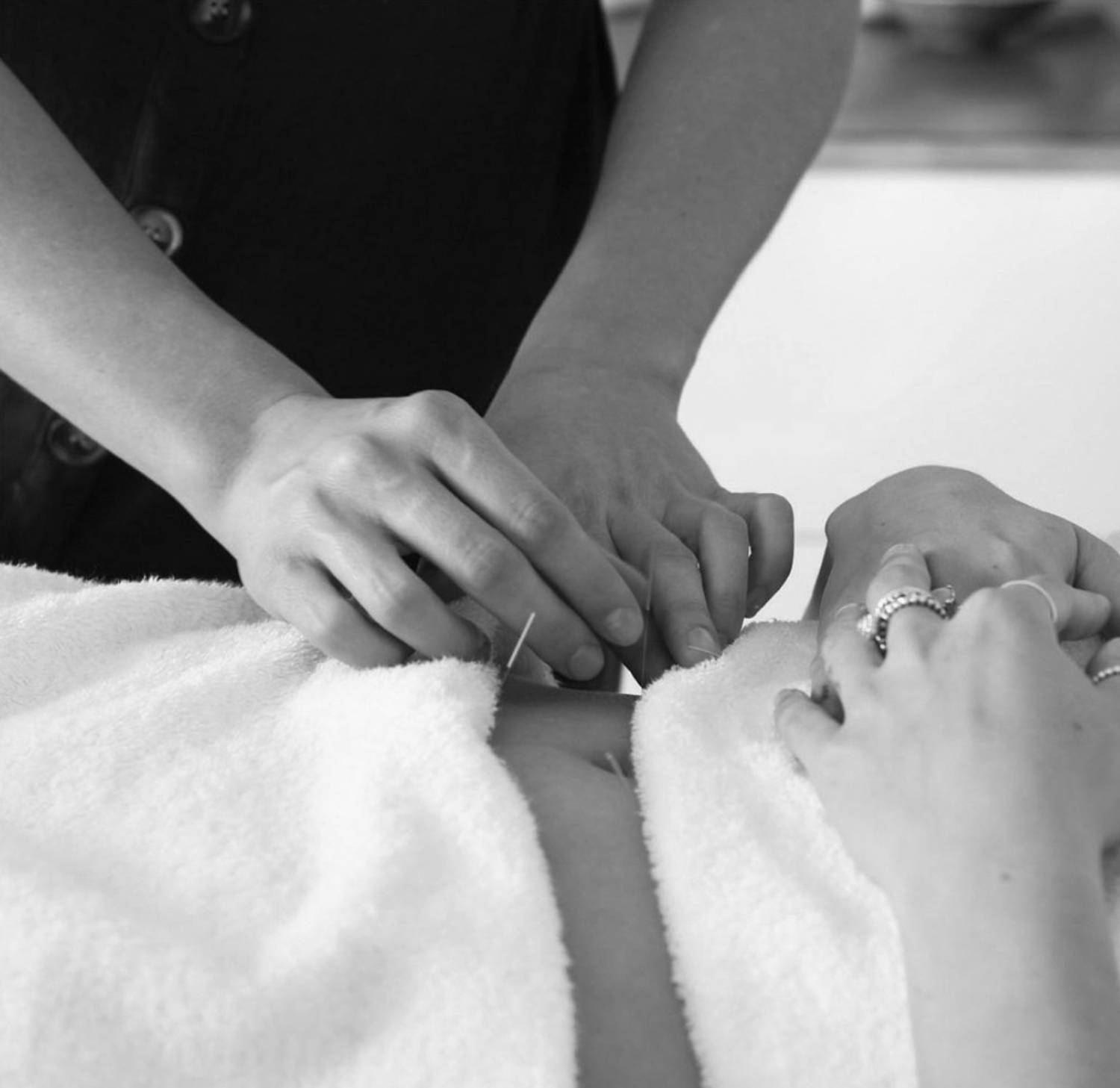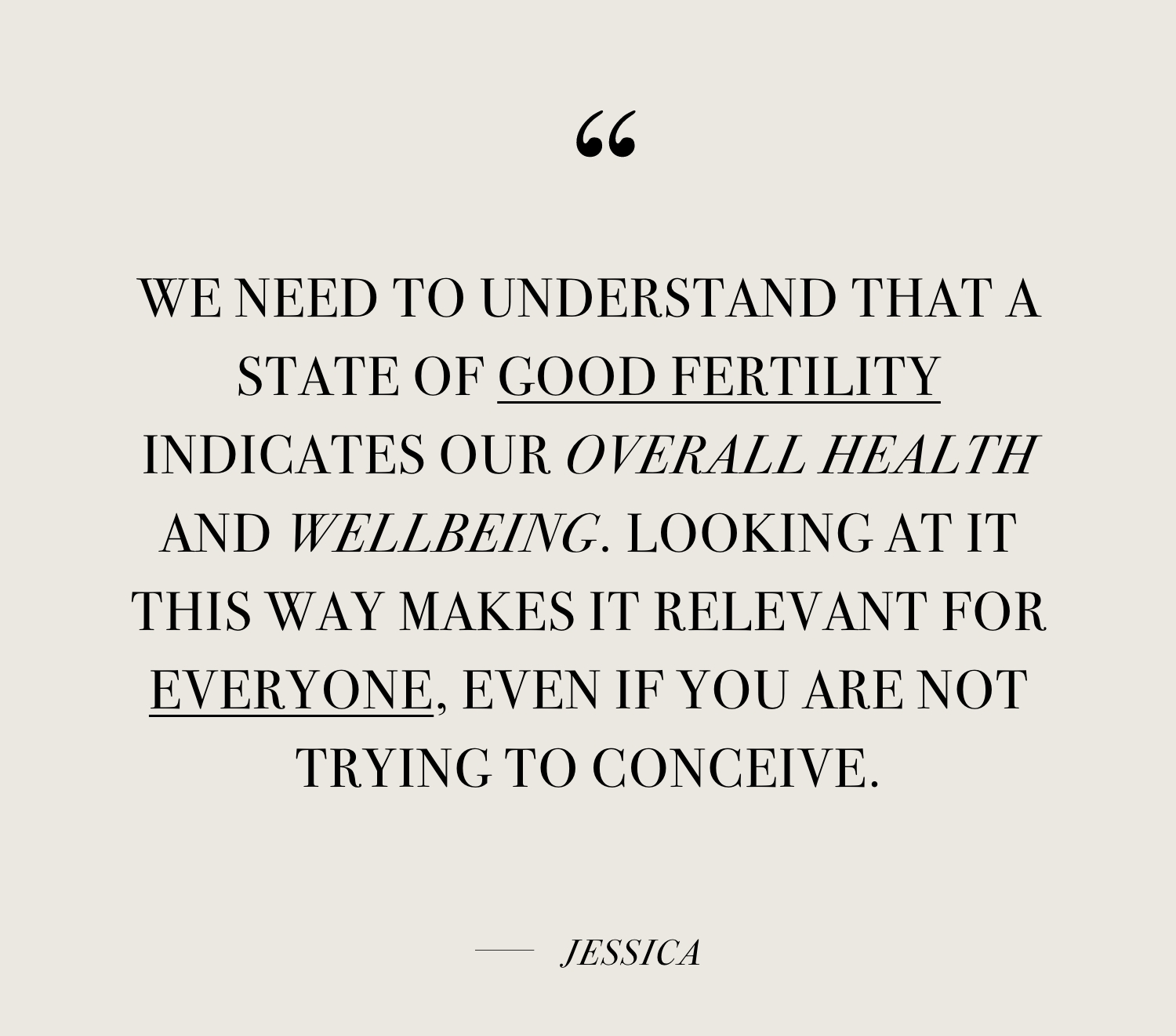1. Anjana B et al, 2014, Neurosci Bio Rev, 51, 138- 150
2. Drolet G et al, 2001, Progress Neuro-Psychopharm + Biol Psych, 25, 729 – 741
3. Zhang W et al, J Altern Complement Med. 2009 Aug;15(8):837-44
4. Chin-Min Chuang. Am Jnl Chin Med 2007, 35, 779 – 791
5. Lundberg T, Acupuncture in Medicine 2002;20(2-3):109-120
6. So et al, Hum Reprod. 2009 Feb;24(2):341-8
7. Eshkavari L et al, Endocrinology. 2015 Oct;156(10):3649-60
8. Jensen L and Jensen S, Scand J Dent Res. 1982; Oct;90(5):397-403

Article by Jessica Hewett, Acupuncturist and Founder of Nüwa Natural Health
When we talk about fertility, the obvious comes to mind - our ability to conceive and have a baby. This may be true, however we also need to understand that a state of good fertility indicates our overall health and wellbeing. Looking at it this way makes it relevant for everyone, even if you are not trying to conceive.
Fertility rates and health are declining, with 1 in 6* couples in Australia today experiencing difficulty falling pregnant (*IVF Australia 2018)
So why is this?
There are many factors that could be contributing to difficulties falling pregnant: environmental issues, stress, diet, lifestyle…..the list could go on. It can seem complicated, but it doesn't always have to be.
To sum it all up the formula to successful conception a healthy egg, good quality sperm and a nutritious uterine environment. When we look at figures, very few couples are clinically infertile. In reality, most of those struggling are just subfertile, hormonally unbalanced and need to work on their health.
So where to go from here?
Preconception care routine:
This is the first step towards making your baby, and getting your body prepared and healthy before, as well as during, your pregnancy. Preconception care will give your baby the best chance of developing, both inside and outside the womb. This can include diet, supplementation, alternative medicine (acupuncture, naturopathy etc), stress reducing practices and an overall devotion to improving health and wellbeing.
Start Tracking your cycle
Understanding your own body is crucial to falling pregnant (or not falling pregnant if you are using it for contraception). Tracking your Basal Body Temperature (BBT), alongside observing cervical mucus changes and cervical positioning can be great tools to help identify your fertile window.
Understanding your own body is crucial to falling pregnant (or not falling pregnant if you are using it for contraception). Tracking your Basal Body Temperature (BBT), alongside observing cervical mucus changes and cervical positioning can be great tools to help identify your fertile window.
It takes two to Tango!
Don’t forget your partner is half the equation, be it man or woman. They may also need to look at their overall health, or work on connecting with each other and forming a stronger bond. Sperm health overall is declining*, and therefore, it is important to have this checked sooner rather than later. This is also something to consider in same sex couples when choosing your donor (*IVF Australia 2018)
Don’t forget your partner is half the equation, be it man or woman. They may also need to look at their overall health, or work on connecting with each other and forming a stronger bond. Sperm health overall is declining*, and therefore, it is important to have this checked sooner rather than later. This is also something to consider in same sex couples when choosing your donor (*IVF Australia 2018)

Fertility Investigation
If you are having difficulty falling pregnant, in many cases you are required to undergo blood tests and other investigations to put more pieces of the puzzle together. Blood tests can check hormone levels, and ultrasounds are used to check ovulation and can indicate certain conditions such as Polycystic Ovarian Syndrome (PCOS). If required, further testing can involve genetic testing & surgery* (*IVF Australia 2018).
Acupuncture, Chinese Medicine & Fertility
Traditional Chinese Medicine (TCM) is a comprehensive health system over 5000 years old. Grounded in the Taoist/Daoist belief, Chinese medicine views each person as an individual as well as being interconnected with our environment and earth. When looking at treating disease and imbalances, TCM considers the flow of energy - Qi (pronounced ‘chee’ ) - through connected pathways known as meridians or channels. These channels also flow through organs and tissues, as well as over 500 acupuncture points throughout the body. The smooth flow of this energy is required for the body to be in balance, so acupuncture, herbs, lifestyle, diet, exercise and breathing practices all contribute to the smooth flow of Qi in our bodies.
Traditional Chinese Medicine (TCM) is a comprehensive health system over 5000 years old. Grounded in the Taoist/Daoist belief, Chinese medicine views each person as an individual as well as being interconnected with our environment and earth. When looking at treating disease and imbalances, TCM considers the flow of energy - Qi (pronounced ‘chee’ ) - through connected pathways known as meridians or channels. These channels also flow through organs and tissues, as well as over 500 acupuncture points throughout the body. The smooth flow of this energy is required for the body to be in balance, so acupuncture, herbs, lifestyle, diet, exercise and breathing practices all contribute to the smooth flow of Qi in our bodies.
How can Chinese medicine assist you on your fertility journey?
If we circle back to the discussion about fertility indicating the overall health of a person, we can start to see how alternative medicines can play a big role.
Acupuncture
Acupuncture involves the insertion of fine needles into selected acupuncture points to stimulate body tissues and manipulate Qi within the meridians, thus assisting in moving Qi, increasing blood flow and restoring homeostasis within the body. Acupuncture can help restore your body, mind and spirit to a state of balance, not only by addressing presenting symptoms, but also treating the root cause of the imbalance.
Acupuncture involves the insertion of fine needles into selected acupuncture points to stimulate body tissues and manipulate Qi within the meridians, thus assisting in moving Qi, increasing blood flow and restoring homeostasis within the body. Acupuncture can help restore your body, mind and spirit to a state of balance, not only by addressing presenting symptoms, but also treating the root cause of the imbalance.
How does Acupuncture work?
The research into the effectiveness of acupuncture for certain conditions is constantly growing and expanding.
The research into the effectiveness of acupuncture for certain conditions is constantly growing and expanding.
Currently research supports the theory that acupuncture can initiate responses from the central nervous system (CNS), help increase blood flow, as well as stimulate the release and regulation of natural chemicals such as endogenous opioids, neurotransmitters (e.g. serotonin and dopamine) and our stress hormones.
● The endogenous opioid system reduces the stress response and its effects on the body. It also builds resilience to stress responses. How does this relate to fertility? Because acupuncture can have effects on the endocrine system (hypothalamic-pituitary-adrenal or HPA axis, the autonomic nervous system (ANS), as well as influence emotional and behavioral responses in the body. (1,2).
● Serotonin, dopamine and oxytocin are happy feel good chemicals, and acupuncture can increase the levels and activation of these in our brain and
nervous system. (3,4,5).
nervous system. (3,4,5).
● Acupuncture can reduce the levels of stress hormones cortisol, ACTH (adrenocorticotropic hormone), adrenaline and noradrenaline, thus reducing
stress levels overall. (6,7,8) It's clear to see that lowering stress levels and increasing blood flow in our body is going to have a direct effect on our overall well being, and therefore our fertility health.
stress levels overall. (6,7,8) It's clear to see that lowering stress levels and increasing blood flow in our body is going to have a direct effect on our overall well being, and therefore our fertility health.
Who might find it beneficial to embrace acupuncture & Chinese medicine for preconception care?
● healthy single women or couples (including same sex couples) who want to be as healthy and balanced as they can be to give their baby the best start to life
● women and couples who have been diagnosed with either primary or secondary infertility. This can include, but is not limited to, issues with sperm
quality, anovulation, amenorrhoea etc.
● women and couples who have experienced one or more miscarriages
● women and couples currently preparing for, or undertaking IVF or ART treatment who are wanting to complement their treatment plan to improve success
● healthy single women or couples (including same sex couples) who want to be as healthy and balanced as they can be to give their baby the best start to life
● women and couples who have been diagnosed with either primary or secondary infertility. This can include, but is not limited to, issues with sperm
quality, anovulation, amenorrhoea etc.
● women and couples who have experienced one or more miscarriages
● women and couples currently preparing for, or undertaking IVF or ART treatment who are wanting to complement their treatment plan to improve success
REFERENCES
SEE MORE FROM JESSICA HEWETT & NÜWA NATURAL HEALTH
instagram | @nuwanaturalhealth
website | nuwanaturalhealth.com.au
